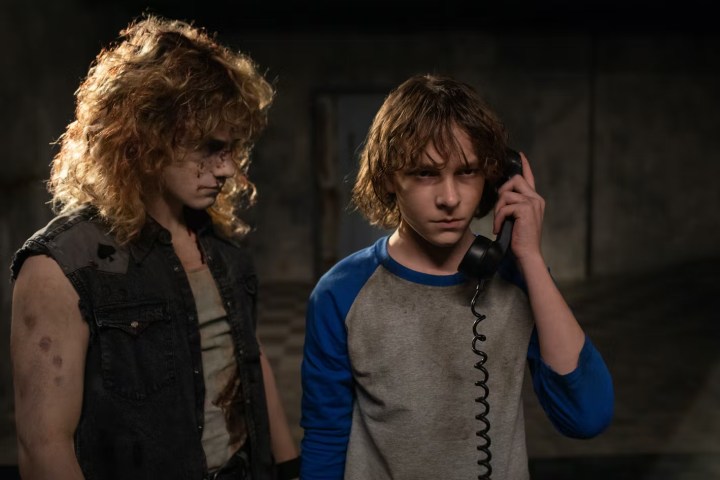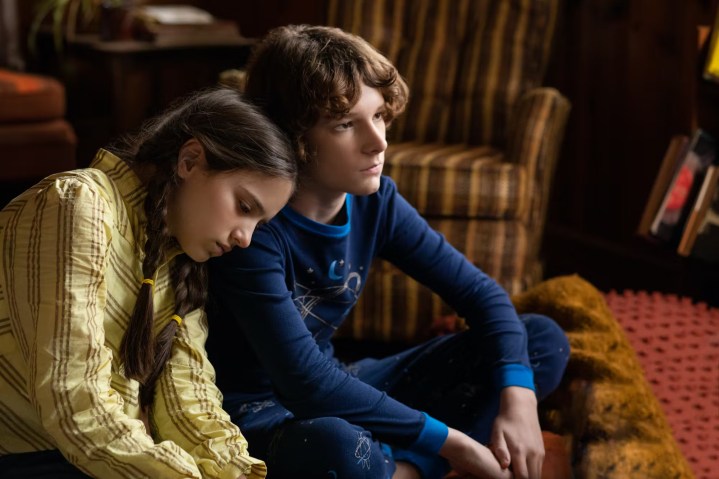The Black Phone is at its best when it’s working with as little as possible. A majority of the new film from Doctor Strange director Scott Derrickson takes place in a grimy basement, but it manages to make the most out of its central confined space — filling it with intimidating shadows and secrets for its protagonist to discover over the course of The Black Phone’s 102-minute runtime. Based on a short story of the same name by Stephen King’s son, Joe Hill, the film follows a young boy who gets kidnapped by a notorious child killer and has only a few days to escape before he becomes the man’s next victim.
The film’s premise supplies it with an easy-to-grasp conflict and enough tension to sustain a feature-length story, and when The Black Phone actually focuses on its young protagonist’s efforts to escape from the soundproofed basement he’s found himself trapped in, it works as a visceral, occasionally spooky horror-thriller. It’s when The Black Phone attempts to bend its thriller plot to be compatible with certain themes about abuse and self-esteem, however, that the film comes up disappointingly short.
Calls from the other side

Set in the late 1970s, The Black Phone takes place in a suburban Colorado town that has recently found itself living in fear of a notorious child kidnapper known only as “The Grabber” (Ethan Hawke). Several children have already gone missing by the time Finney Shaw (Mason Thames), a kindhearted young boy from an abusive home, is drugged and trapped in a basement by Hawke’s sadistic criminal. Shortly after his capture, Finney’s nightmarish entrapment quickly takes a surreal turn when the disconnected phone that hangs from one of the basement’s walls begins to ring.
When Finney answers the phone, he discovers that it allows him to communicate with the ghosts of the children that The Grabber has previously killed. The film then follows Finney as he attempts to escape from his captor’s basement by using the knowledge and advice of those who have already been trapped there. At the same time, Finney’s younger sister, Gwen (Madeleine McGraw), finds herself experiencing otherworldly visions and dreams, which she uses to try and discover where her brother is being kept.
Gwen’s quest allows Derrickson to frequently cut away from Finney’s imprisonment in The Grabber’s basement — gifting the film with moments of brief humor and reprieve from the claustrophobic tension of its central sequences. That said, Derrickson, who has returned to the horror genre after briefly taking a detour into the MCU, never misses a chance to ratchet up the tension as much as possible during the film’s Grabber scenes. One midpoint sequence involving a bike lock, in particular, easily ranks as one of the tensest stretches of any film released so far this year.
Tangled in black balloons

However, The Grabber’s imprisonment of Finney is not the only form of abuse that’s depicted in The Black Phone. The film’s overlong opening act is relentlessly violent and that’s true without even counting certain scenes involving Finney and Gwen’s abusive father, Terrence (Jeremy Davies), one of which sees him repeatedly beat Gwen with his belt while Finney watches helplessly from across the room. The sequence in question is shockingly brutal, and it sets a mean-spirited tone that’s difficult for The Black Phone to shake off from that point on.
Derrickson, to his credit, remains as talented as ever at making the violence in his films feel visceral and authentic, but depicting real-world, grounded forms of violence like child abuse requires a level of deftness and sensitivity that The Black Phone lacks. The film’s early instances of mundane violence only begin to stand out more, however, once certain dreamlike elements are introduced.
Derrickson uses the film’s titular phone to conjure several inspired, memorable images, like that of a child’s ghost hanging upside down in one corner of The Grabber’s basement, the youngster’s presence initially made clear only by the sound of their blood perpetually dripping onto the floor. In several of the film’s most visually inspired moments, Finney also sees the phone expand and shrink at the same measured pace as a heart. Combined, these images inject The Black Phone with several refreshing, dreamlike moments of grim escapism, which make the otherwise all-too-real horror of Finney’s situation slightly easier to take.
An unrewarding ordeal

As Finney, Thames turns in a surprisingly assured, measured performance. McGraw also shines as Gwen, Finney’s feisty and caring younger sister, and the ride-or-die bond that exists between Gwen and Finney is easily the most emotionally affecting element of The Black Phone. Hawke, meanwhile, turns in a reliably charismatic, in-your-face performance as the film’s blandly named villain. As is usually the case with Hawke’s characters, he manages to add several more shades to someone who is rather thinly sketched.
But for as effective as the performances in The Black Phone are, nothing in the film is strong enough to save it from itself. The film’s attempts to say anything of worth about abuse are, at best, muddled and unclear and, at worst, deeply troubling. Not content with allowing the film to exist solely as an exercise in tension and suspense, Derrickson and co-writer C. Robert Cargill attempt to turn The Black Phone into a kind of coming-of-age tale for Thames’ Finney. Consequently, the film goes out of its way in its first act to establish Finney as a young man incapable of fighting back against his abusers. It’s a flaw the film argues he needs to overcome.
In certain contexts, that would be a powerful and worthwhile message, but it’s one that doesn’t really work here. The film’s belief in the necessity of fighting back is commendable, but less so when it tries to send that message while also telling a story about a boy who is repeatedly physically abused by his father. Beyond that, using his imprisonment and kidnapping as the dramatic event that gives Finney confidence that he needs to talk to the girl he’s always had a crush on is a wildly misguided idea — one that greatly underplays the severity of the kind of trauma and abuse that Finney experiences throughout The Black Phone.
With that in mind, it’s hard to talk about The Black Phone without thinking of Leigh Whannell’s modern take on The Invisible Man. That 2020 thriller attempts to use a heightened genre story as a vehicle to investigate the complexities of abuse in much the same way that The Black Phone does. But what The Invisible Man understands that The Black Phone doesn’t is that personal abuse, whether it’s coming from a parent or partner, isn’t something you beat — it’s something you survive. Apparently, that’s a call the makers of The Black Phone didn’t receive.
The Black Phone hits theaters on Friday, June 24.
Editors' Recommendations
- 3 underrated Peacock horror movies you need to watch in February
- 10 best social horror and thriller movies, ranked
- Amsterdam review: An exhausting, overlong conspiracy thriller
- Donald Sutherland makes a call from the afterlife in Mr. Harrigan’s Phone
- The Woman King review: a thrilling period epic




